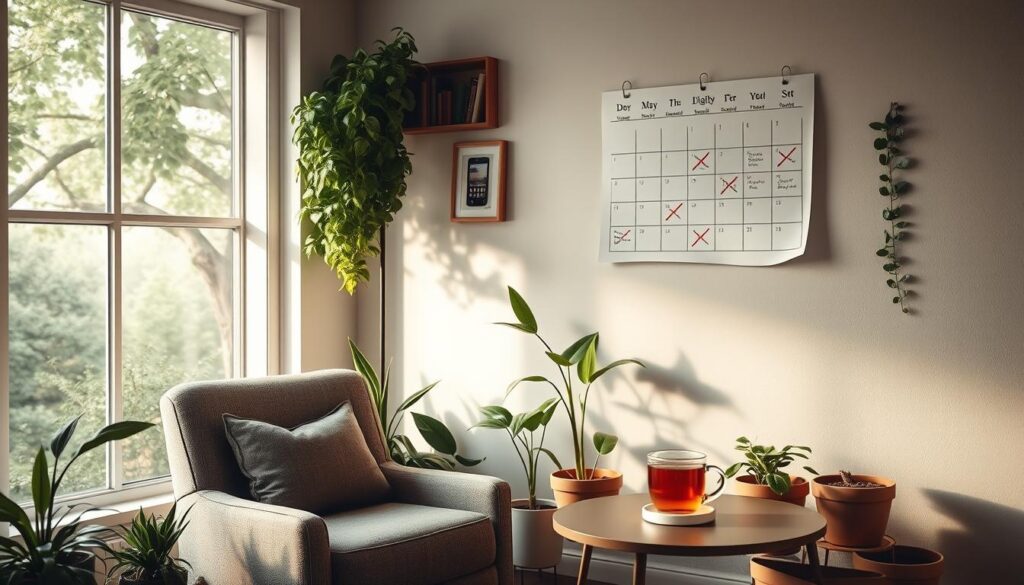Can taking a break from social media really help our mental health? I’m diving into social media detox to find out. I’m excited to share what I learn with you.
Social media can deeply affect our well-being. Taking a break is key to better digital wellness and mental health.
By stepping away from social media, we can take back our time. We can focus better and have a healthier tech relationship. This leads to better mental health and a higher quality of life.
Understanding Social Media’s Grip on Modern Life
Thinking about my social media use, I see how it’s woven into my daily life. But what makes us keep coming back? To grasp social media’s hold, we must look into its psychological roots. Social media addiction is a serious issue, and understanding its psychological causes is key.
The reasons behind social media addiction are intricate. They include dopamine loops, the need for social validation, and the fear of missing out (FOMO). These factors make it hard to disconnect from social media. As we dive deeper into social media, we must think about its effects on our mental health and relationships.
The Psychology of Social Media Addiction
Studies show that social media activates our brain’s reward system, releasing dopamine. This can create a cycle of addiction, making it hard to stop using it.
How Social Platforms Hook Your Brain
Social media uses tricks to keep us hooked. It personalizes content, sends notifications, and has endless scrolling. These features activate our reward system, making it hard to resist checking our accounts all the time.
The Real Cost of Constant Connectivity
The price of always being connected goes beyond our mental health. It affects our relationships, productivity, and overall well-being. As we explore social media, it’s crucial to see the risks and find a balance between our online and offline lives.
Why You Need a Social Media Detox
Reflecting on my social media use, I see the need for a social media detox for better digital wellness. Disconnecting helps anyone avoid toxic comparisons and cyberbullying. These can harm someones mental health.
Choosing to detox from social media is a strong step towards a healthier tech relationship. It lets me practice mindfulness and enjoy activities like exercise, meditation, and nature walks. These activities boost my mental health.
By detoxing, I break the endless need to be connected. This leads to better mental health, more productivity, and a calmer life.
As we face today’s challenges, focusing on digital wellness is key. A social media detox helps us reconnect with ourselves and the world.
Signs You’re Due for a Digital Reset
It’s easy to get lost in the endless flow of information and alerts. But when does it become too much? Feeling tired, irritable, or disconnected might mean it’s time for a digital reset.
Physical signs like headaches or eye strain can signal it’s time to step away from screens. Also, mental health indicators like increased anxiety or depression show your digital habits might be harming you.
Physical Warning Signs
Feeling tired, having trouble sleeping, or struggling to focus are common signs. If you’re experiencing these, it’s time to rethink your digital habits.
Mental Health Indicators
Feeling lonely or isolated can also mean you need a digital reset. Taking a break from screens and focusing on real-life connections can boost your mental health.
Social Relationship Red Flags
Seeing a drop in face-to-face time or more fights with loved ones is a warning sign. Prioritizing real-life connections can strengthen your relationships and improve your well-being.
The Science Behind Social Media’s Impact on Mental Health
Exploring social media’s effects on our well-being, I see science is key. Studies reveal social media can deeply affect our mental health. It can lead to more anxiety and depression, lower self-esteem, and less happiness in life.
The endless flow of info on social media can change our brain chemistry. This can make us feel not good enough and lower our self-worth. Also, not having real-life talks can cause us to feel alone. This isolation is a big risk for mental health problems. Knowing the science behind these issues helps us find ways to stay healthy online.
Being mindful of the dangers and actively managing our social media use can protect our mental health. It helps create a more positive online space. As we deal with the challenges of social media and mental health, we must rely on science to guide us. This way, we can build a healthier online community.
Planning Your Social Media Detox Strategy
Creating a social media detox strategy is key. It’s important to set realistic goals. Be honest about how much time you spend online and where you can reduce it. A good detox plan involves a thoughtful approach to using technology.
Think about what fits your lifestyle when planning your detox timeline. You might limit your social media use to certain times. Having a support system is also crucial. This could be a friend, family, or a professional who helps you stay on track. For tips on staying motivated, check out this resource.

Setting realistic goals and having a support system boosts your chances of success. Remember, a detox isn’t about cutting out social media entirely. It’s about finding a healthier balance with technology.
Essential Tools and Apps for Digital Wellness
The right tools and apps are key. They can help you have a better relationship with technology.
There are many tools out there, like website blockers and app trackers. There are also mindfulness apps and digital journals. These tools can help you stay focused and avoid distractions.
Some popular apps track your screen time and offer guided meditations. They also give tips to improve digital habits. Using these tools, you can control digital life and make smart choices about technology.
By using these tools daily, they keep your digital wellness in check. I balance my tech use with other parts of my life. I hope you explore these resources and find what works for you.
Replacing Social Media with Meaningful Activities
Meaningful activities become key – they bring joy, help us connect, and enrich our lives. Adding offline social connection to our days strengthens relationships and builds community.
Productive Time Management
Effective time management is crucial for using our time and energy wisely. Setting clear goals helps us focus on what’s important. This makes room for meaningful activities like exercise, meditation, or creative pursuits.
Creative Alternatives to Scrolling
Instead of scrolling, try painting, writing, or photography. These creative outlets let us express ourselves and explore new ideas. They help us manage our time more productively and prioritize what’s truly important.
Handling Withdrawal Symptoms and Challenges
Starting a social media detox can be tough, both in your mind and body. You might feel anxious, worried about missing out, or even get headaches and feel tired. These emotional responses are normal and help you understand what to expect and how to deal with them.
The physical adjustment phase is hard but important. Your body needs time to get used to not being glued to screens all day. Be gentle with yourself as you go through this change. Remember, it’s a journey, and you can take it one step at a time.
While facing these challenges, remember it’s not just about avoiding social media. It’s about finding new, enjoyable activities that make you happy. This way, you’ll be ready for the withdrawal symptoms and emotional responses that come up. With time, you’ll find it easier to adjust and enjoy a healthier balance with social media.
Maintaining Digital Balance After Your Detox
I see that keeping a digital balance is a continuous effort sometimes. It needs a long-term strategy that includes self-care, mindfulness, and connecting with others. By setting limits on tech use, we make room for deeper connections and activities.
Being mindful of our tech habits is key to maintenance. It’s about knowing how tech affects our health and making smart choices. This way, we build a healthier tech relationship and keep a balance in our lives.
Creating a long-term strategy for digital balance is essential. We can set achievable goals, plan out our tech time, and find new activities. Taking control of our tech use helps avoid burnout and keeps our lives balanced.
Maintaining digital balance is a personal journey that needs dedication and patience. By focusing on our well-being and using tech mindfully, we can have a healthier relationship with it. This improves our overall life quality.
Embracing a More Present and Connected Life
The goal of a social media detox is more than just cutting down screen time. It’s about living in the moment and feeling more connected. By stepping away from digital distractions, you can find joy in the present.
Practicing mindful living helps you enjoy your surroundings. You’ll appreciate the little things and build stronger bonds with loved ones.
After your detox, make a point to be more mindful. Spend time without tech with your family and friends. Try new activities that bring you closer to your community.
Remember, keeping a balance between digital and real life is key. Your happiness depends on it.
Stay Connected and Enhance Your Well-Bing
- Free Training: Realign Your Wellness
- Explore More Free Resources: Wellness Resources
- Contact Us: info@clarissabooker.com
- Watch on YouTube: Clarissa Booker
Stay connected with us for tools, resources, and support on your holistic wellness journey!

